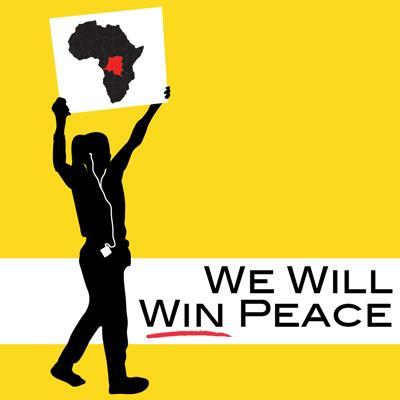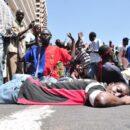AU Panel in Zalingei: “It Went Well. We Told Them.”
The three former presidents who head the African Union Panel on Darfur are no strangers to conflict and controversy. President Pierre Buyoya made this clear to a meeting of IDPs in Hamadiya camp, on the outskirts of Zalingei, today. He said, “I come from a country that has been through civil war and genocide.” He referred to the passionate and sometimes angry accounts of the marginalization, abuses and sense of powerlessness recounted by the IDP camp delegates, not only represented Hamadiya but other camps in Jebel Marra, Zalingei, Wadi Saleh and Mukjar, such as Hassa Heissa. He continued, “We have to come out of this situation of misery and hopelessness. That is why we are here. We know something about conflict. We know something about the frustrations of people.”

The AU Panel has encouraged its interlocutors to speak frankly. Many of them have been outspoken, directing accusations against one another. (Some details will follow later.) Some have criticized the AU. In Kalma camp last month, the IDPs insisted that they wanted their grievances addressed in a comprehensive and guaranteed manner before they could engage in any political process. “If you want to talk politics, go to Paris,” one representative told the Panel. The meeting in Hamadiya today was comparable. It was smaller, and the IDPs had been given the chance to prepare the previous day with a workshop structured around a questionnaire. Having earlier said they would boycott the Panel, in the event they were ready to meet the Panel and express their opinions.
The principal spokesman was Adam Boush, IDP representative from Hassa Heissa. After a very brief welcome, he said, “Whoever comes here, we explain to them, they listen and go away and forget about it, and this has never achieved anything, ever.”
Boush went on to describe the crisis in Darfur as he saw it. “The problem began before independence, during the Turkish era. The problem continued since. It escalated when Omar al Bashir completed a plan prepared by the central government since independence. The humanitarian crisis is the result of that plan for genocide. Omar al Bashir has committed genocide on us. He tried to evacuate us from our own land, with robbery, burning down farms, bringing people from Chad and Niger and from Palestine to occupy our land. He wants to put Palestinians here. This is a hidden, secret thing which is known to us. We are the owners of this land.”
He was highly critical of the AU. “We appreciate those who tried to help us. We are proud of being African, we are true black people. We blame our African brothers who haven’t stood beside us. We are a minority, suffering at the hands of a majority who want to eliminate us.”
Boush insisted on practical results, not “implementation in government offices,” but implementation that would truly change the lives of the people. “At least you must bring back the expelled organizations. You have to show seriousness, earnestness in solving the problem. If you ignore these issues, your efforts will end up the same as those of Salim Ahmed Salim in Abuja, or Arusha, and those of Djibril Bassole, all like before, it will all end up as paperwork, nothing more.” He was dismissive of many of the groups which the Panel has been consulting, waving away the importance of “political parties, native administration, civil society organizations, imaginary movements””all of these are a reason that has contributed to the suffering of the people who are here.”
The IDP representatives presented a paper which started off with a challenge to the AU and the Panel, saying that they lacked competence, credibility, neutrality and independence.
What needs to be done? The presentation identified the following ten main points:
1. Disarm the Janjawiid;
2. Acknowledge the historic hawakir (tribal lands);
3. Expel new settlers on occupied lands;
4. Prosecute criminals before the ICC according to its mandate;
5. Change UNAMID to an international force under Chapter 7 of the UN Charter in accordance with UNSCR 1706;
6. Reconstruct the Sudanese police forces, security and army, as independent national forces;
7. Place Darfur under international trusteeship as an area free of weapons;
8. Establish a no-fly zone;
9. Return the humanitarian organizations which were expelled;
10. The government must stop its propaganda about the voluntary return of IDPs.
“Implementing these is the route to peace in Darfur,” concluded the spokesman.

Concerning reconciliation, the IDP representatives argued that it was not a relevant consideration. According to them, there was no conflict among the communities of Darfur, rather an occupation of Darfur by the NCP. The crisis was purely a political problem between the centre and Darfur.
Concerning justice, the IDP representatives demanded that the ICC should prosecute President Bashir and others. One female IDP insisted that there could be no dialogue and no reconciliation before the prosecution of the man she called the “former president.” They dismissed the Sudanese judiciary out of hand.
On the topic of Darfur within Sudan, the IDPs presented a radical position. The problem of Darfur had begun with the Turko-Egyptian invasion of 1874, they argued. In settlement of the problem, the following points were put forward:
1. The Sudan Government must recognize the full rights of the people of Darfur;
2. A secular state is needed, with citizenship as the basis for rights, with separation of state and religion, and related to this, the establishment of a new governance system based on social facts and realities, and a truly federal system;
3. Recognize Darfurian identity as an integral definition of what it is to be Sudanese;
4. Division of power, in its executive, legislative and judicial branches, and positions in institutions of civil service and education, in a fair manner with positive discrimination to eliminate the effects of war and marginalization;
5. The right of self-determination for Darfur;
6. Elections after a comprehensive and just peace.
Boush explained, “We must have the right of self-determination. This has not been brought by the Turks, by the English, by the Sudan Government. We must have the right to vote [on self-determination] just like the south. If they go their own way, we must also have the right to vote for that change too.” He explained the relationship between elections and self-determination in the following terms: “If such elections are held, if we win in Darfur, we shall be separating Darfur from Sudan.”
The IDP statement concluded with the words, “Support for our great courageous leader and fighter who has never tired in calling for our rights.”
Responding, President Buyoya defended the AU. “The AU is our organization, and it is also your organization. We know our strengths, we know our weaknesses. The AU came to Darfur when no other international organization wanted to come. Africans came here and served in Darfur, and some of them died here in Darfur.” He continued, “If you are not happy with what the AU has already done, you can ask the AU to correct any mistakes it has done.”
Boush replied, “The AU was the desire of the Sudan Government, not the IDPs. AMIS failed for three years and was changed to UNAMID, which is still unable to succeed. We are the victims. We do not object to American soldiers coming to protect us.”

President Mbeki addressed this point. “Let us be clear, there is no American soldier coming here to Darfur. There is no European soldier coming to Darfur. No American or European will come and die in defence of your interests. It’s not going to happen. So the challenge remains. The challenge of security remains with us.”
Throughout the sessions, Mbeki has stressed that any solution to Darfur must come from the Sudanese, and above all the Darfurians, and that it cannot be imposed from outside. “You can make this demand for American or European forces to replace UNAMID. It will not happen. We should not operate on the basis of a dream that is not going to be realized.”
As will be clear from this summary, the meeting was conducted in a tense atmosphere. All those who spoke were young people. None of the elders who had formerly been camp sheikhs came forward to speak. But after the formalities were concluded, the atmosphere became much more convivial, with exchanges of greetings, and regrets expressed by the IDPs that there was not longer to continue the discussion. Also at this time, one of them promptly made a phonecall and could be heard saying, “It went well. We told them.”





